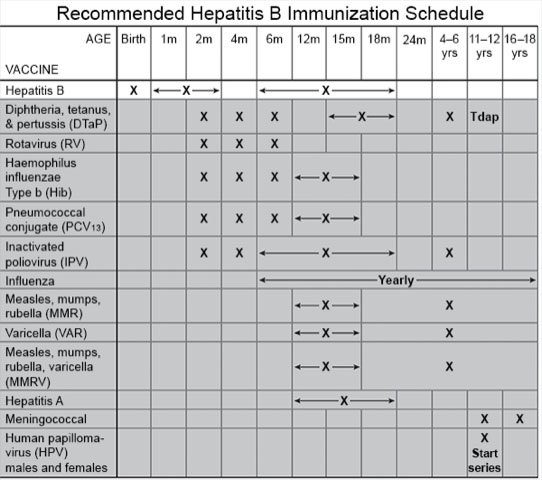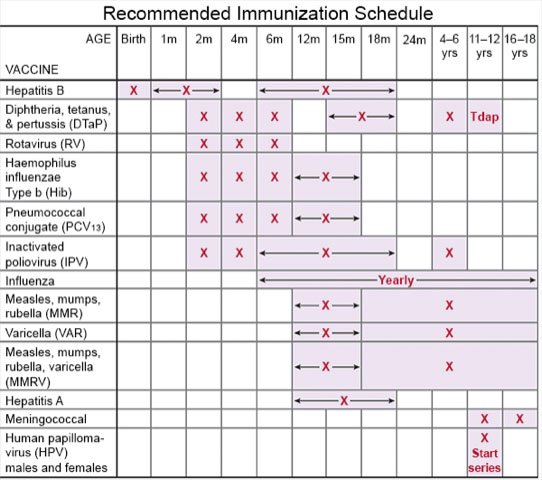Hepatitis B in Children
Medically reviewed by Drugs.com. Last updated on Aug 4, 2025.
Hepatitis B is inflammation of the liver caused by hepatitis B virus (HBV) infection. The infection is called acute when a person first becomes infected. The infection becomes chronic after 6 months. Chronic hepatitis B is less common in children than in adults.
 |
DISCHARGE INSTRUCTIONS:
Return to the emergency department if:
- Your child has a sudden, severe headache and head pressure.
- Your child has new or increased bruising or red or purple dots on his or her skin. He or she may also have bleeding that does not stop easily.
- Your child's abdomen is swollen.
- Your child has severe nausea or cannot stop vomiting.
- You see blood in your child's urine or bowel movements, or he or she vomits blood.
- Your child has new or increased yellowing of the skin or the whites of the eyes.
- Your child has severe pain in his or her upper abdomen.
Call your child's doctor if:
- The palms of your child's hands are red.
- Your child has a fever.
- Your child has new or increased swelling in his or her legs, ankles, or feet.
- Your child's muscles get smaller and weaker.
- You have questions or concerns about your child's condition or care.
Medicines:
- Check with your child's healthcare provider before you give him or her any medicine. This includes over-the-counter medicine, herbs, and vitamins. Some medicines can affect or damage your child's liver.
- Antiviral medicines help fight HBV and keeps it from spreading in your child's body.
- Give your child's medicine as directed. Contact your child's healthcare provider if you think the medicine is not working as expected. Tell the provider if your child is allergic to any medicine. Keep a current list of the medicines, vitamins, and herbs your child takes. Include the amounts, and when, how, and why they are taken. Bring the list or the medicines in their containers to follow-up visits. Carry your child's medicine list with you in case of an emergency.
How HBV is spread:
HBV can spread from a mother to her baby during delivery. A baby who gets infected with HBV during birth has a high risk for developing chronic hepatitis B. HBV also spreads through contact with infected blood or body fluids. HBV can enter your child's body through a cut or scratch in his or her skin or through mucus membranes. HBV can live on objects and surfaces for 7 days or longer.
Manage hepatitis B:
- Have your child eat a variety of healthy foods. Healthy foods include fruits, vegetables, low-fat dairy products, beans, lean meats and fish, and whole-grain breads. Ask if your child needs to be on a special diet.

- Have your child drink more liquids. Liquids help your child's liver function properly. Ask your healthcare provider how much liquid your child should drink each day and which liquids are best for him or her.
- Talk to your adolescent about not drinking alcohol. Alcohol can increase liver damage. Talk to his or her healthcare provider if he or she drinks alcohol and needs help to stop.
- Talk to your adolescent about not smoking. Nicotine can damage blood vessels and make it more difficult to manage hepatitis B. Smoking can also lead to more liver damage. Ask your adolescent's healthcare provider for information if he or she currently smokes and needs help to quit. E-cigarettes or smokeless tobacco still contain nicotine. Talk to the provider before your adolescent uses these products.
Help prevent the spread of HBV:
- Talk to your child's healthcare provider about the hepatitis B vaccine. The vaccine helps protect your child from the virus that causes hepatitis B. Babies are routinely given a hepatitis B vaccine dose 24 to 48 hours after birth. A second dose is given at 1 to 2 months, and a third dose at 6 to 18 months.

- Have your child cover any open cuts or scratches. If blood from a wound gets on a surface, clean the surface with bleach right away. Put on gloves before you clean. Throw away any items with blood or body fluids on them, as directed by your child's healthcare provider.
- Do not let your child share personal items. These items include toothbrushes, nail clippers, and razors. Tell him or her not to share needles.
- Talk to your adolescent about safe sex. If your male adolescent is sexually active, tell him or her to use a condom during sex. Sexually active girls should have their male partners wear a condom.
- Do not let your child donate blood. Donations are screened for HBV, but it is best not to donate at all.
- Protect your baby from hepatitis B. You will be checked for hepatitis B during each pregnancy. This is done even if you received the hepatitis B vaccine or were tested before. Your healthcare provider may recommend you get the hepatitis B vaccine if you never received it. You may need to have an HBV infection treated before you give birth. Your baby will need the hepatitis B vaccine at birth if you plan to breastfeed.
Treatment options
The following list of medications are related to or used in the treatment of this condition.
Prevent the spread of germs:
 |
- Keep your child away from other people while he or she is sick. This is especially important during the first 3 to 5 days of illness.
- Have your child wash his or her hands often. He or she should wash after using the bathroom and before preparing or eating food. Have your child use soap and water. Show him or her how to rub soapy hands together, lacing the fingers. Wash the front and back of the hands, and in between the fingers. The fingers of one hand can scrub under the fingernails of the other hand. Teach your child to wash for at least 20 seconds. Use a timer, or sing a song that is at least 20 seconds. An example is the happy birthday song 2 times. Have your child rinse with warm, running water for several seconds. Then dry with a clean towel or paper towel. Your older child can use hand sanitizer with alcohol if soap and water are not available.

- Remind your child to cover a sneeze or cough. Show your child how to use a tissue to cover his or her mouth and nose. Have your child throw the tissue away in a trash can right away. Then your child should wash his or her hands well or use a hand sanitizer. Show your child how to use the bend of his or her arm if a tissue is not available.
- Tell your child not to share items. Examples include toys, drinks, and food.
- Ask about other vaccines your child needs. Have your child get a yearly flu vaccine as soon as recommended, usually in September or October. Your child should also get at least 1 dose of an updated COVID-19 vaccine. Your child's healthcare provider can tell you other vaccines your child should get, and when to get them.

Follow up with your child's doctor as directed:
Your child may need ongoing tests or treatment. Write down your questions so you remember to ask them during your visits.
© Copyright Merative 2025 Information is for End User's use only and may not be sold, redistributed or otherwise used for commercial purposes.
The above information is an educational aid only. It is not intended as medical advice for individual conditions or treatments. Talk to your doctor, nurse or pharmacist before following any medical regimen to see if it is safe and effective for you.
Learn more about Hepatitis B
Treatment options
Care guides
- Gender Identity in your Adolescent
- Hemoglobin A1c
- Hepatitis B
- Hepatitis B Vaccine
- How to Childproof your Home
- Medication Safety for Children
- Promote Healthy Teeth and Gums in Young Children
Symptoms and treatments
Further information
Always consult your healthcare provider to ensure the information displayed on this page applies to your personal circumstances.
